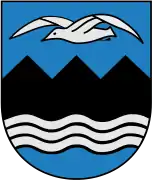Fjell
Fjell is a former municipality in the old Hordaland county, Norway. It is part of the traditional district of Midhordland. The municipality consisted of several islands west of the city of Bergen, the major ones being Litlesotra, the northern part of Store Sotra, Bildøy, Bjorøy, Misje, and Turøy. The administrative centre of Fjell is the village of Straume. Some of the villages in Fjell included Ågotnes, Fjell, Foldnes, Knappskog, Knarrevik, Kolltveit, Landro, and Sekkingstad. On 1 January 2020, the municipality became part of Øygarden Municipality in Vestland county.
Fjell kommune | |
|---|---|
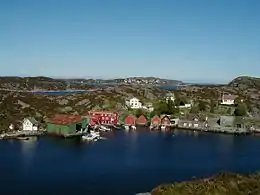 View of the village of Misje | |
|
Flag 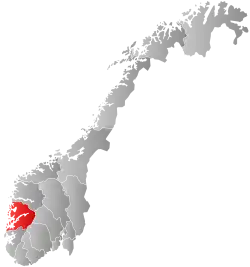 Hordaland within Norway | |
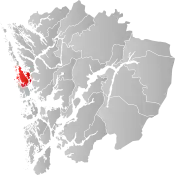 Fjell within Hordaland | |
| Coordinates: 60°20′50″N 05°02′49″E | |
| Country | Norway |
| County | Hordaland |
| District | Midhordland |
| Established | 1 Jan 1838 |
| • Created as | Formannskapsdistrikt |
| Disestablished | 1 Jan 2020 |
| • Succeeded by | Øygarden Municipality |
| Administrative centre | Straume |
| Government | |
| • Mayor (2015-2019) | Marianne S. Bjorøy (Ap) |
| Area (upon dissolution) | |
| • Total | 148.17 km2 (57.21 sq mi) |
| • Land | 141.20 km2 (54.52 sq mi) |
| • Water | 6.97 km2 (2.69 sq mi) 4.7% |
| • Rank | #355 in Norway |
| Population (2019) | |
| • Total | 25,204 |
| • Rank | #43 in Norway |
| • Density | 178.5/km2 (462/sq mi) |
| • Change (10 years) | |
| Demonyms | Fjellsoknar Fjellsokning[1] |
| Official language | |
| • Norwegian form | Nynorsk |
| Time zone | UTC+01:00 (CET) |
| • Summer (DST) | UTC+02:00 (CEST) |
| ISO 3166 code | NO-1246 |
Due to the opening of the Sotra Bridge to the mainland in 1971 and its proximity to the city of Bergen, the population has grown from less than 7,000 to over 25,000 as of 2017. The result is major traffic jams over the bridge every day. The highway that leads to Bergen has reduced the traveling time to only fifteen minutes from the municipal centre at Straume on Litlesotra to the center of Bergen.
At the time of its dissolution in 2020, the 148-square-kilometre (57 sq mi) municipality is the 355th largest by area out of the 422 municipalities in Norway. Fjell was the 43rd most populous municipality in Norway with a population of 25,204. The municipality's population density is 178.5 inhabitants per square kilometre (462/sq mi) and its population has increased by 21.2% over the last decade.[3]
General information
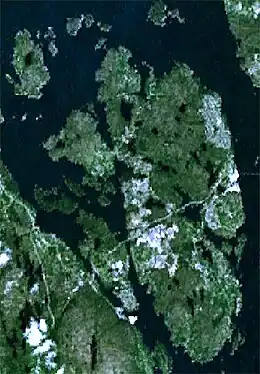
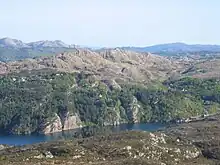
The parish of Fjæld was established as a municipality on 1 January 1838 (see formannskapsdistrikt law). During the 1960s, there were many municipal mergers across Norway due to the work of the Schei Committee. On 1 January 1964, the islands of Misje and Turøyna (population: 404) were transferred from the municipality of Herdla to the municipality of Fjell.[4]
On 1 January 2020, the three neighbouring municipalities of Fjell, Sund, and Øygarden were merged into one large island municipality called Øygarden.[5]
Name
The municipality (originally the parish) is named after the old Fjelde farm (Old Norse: Fjall) since the first Fjell Church was built there. The name is identical to the modern Norwegian word fjell which means "mountain". The oldest form of the name was Undir Fjalli which means "under/below the mountain". Prior to 1918, the name was written Fjæld or Fjeld. In 1918, the spelling was formally set as Fjell.[6]
Coat of arms
The coat of arms was adopted by the municipal council on 27 April 1957 and it was in use until 1 January 2020 when the municipality was dissolved. The blazon is "Azure, a seagull volant argent over a fess sable dancetty topped and wavy with three bars wavy argent beneath". This means the arms have a blue field (background) and the charge is a seagull flying over three triangular black mountain shapes over three wavy lines. The seagull and wavy lines have a tincture of argent which means they are commonly colored white, but if it is made out of metal, then silver is used. A mural crown was often displayed above the shield. The arms were designed to show the geography of the municipality, specifically the sea (shown with three wavy lines) and the steep mountains (shown with three black triangular shapes). The seagull shown above the mountains is a common bird in the area. The arms are canting since the name of the municipality means "mountain". The arms were designed by Magnus Hardeland, but they were never formally approved by the government because they did not meen the Norwegian heraldic guidelines for coats of arms.[7][8]
Churches
The Church of Norway had one parish (sokn) within the municipality of Fjell. It is part of the Vesthordland prosti (deanery) in the Diocese of Bjørgvin.
| Parish (sokn) | Church name | Location of the church | Year built |
|---|---|---|---|
| Fjell | Fjell Church | Fjell | 1874 |
| Foldnes Church | Foldnes | 2001 | |
| Landro Church | Landro | 1977 |
Geography
Fjell was an island municipality located entirely on islands off the coast of the mainland Bergen Peninsula. It covered many islands in a large archipelago that stretched from Sund in the south to Fedje in the north. The largest island in Fjell was Sotra, although only the northern half of the island is part of Fjell. The second-largest island was Litlesotra, where the largest village area in Fjell is located (the village of Straume). The small island of Bildøyna is located between those two islands. The small island of Geitung lies north of Bildøyna and the small island of Bjorøy lies to the south. Bjorøy is not connected to Fjell by road, but there is the undersea Bjorøy Tunnel that connects it to the city of Bergen. On the western side of Sotra, the smaller islands of Algrøyna, Lokøyna, and Syltøyna are located. On the north end of Sotra lies the small islands of Misje and Turøyna.[9]
History
Fjell was the location of Fjell Fortress, a World War II German mountaintop fortification designed to command all water approaches to the port of Bergen.[9]
Population
|
|
| |||||||||||||||||||||||||||||||||||||||||||||||||||||||||||||||
| Note: The municipal borders were changed in 1964, causing a significant change in the population. Source: Statistics Norway[10][11] and Norwegian Historical Data Centre[12] | |||||||||||||||||||||||||||||||||||||||||||||||||||||||||||||||||
Government
While it existed, this municipality was responsible for primary education (through 10th grade), outpatient health services, senior citizen services, unemployment, social services, zoning, economic development, and municipal roads. During its existence, this municipality was governed by a municipal council of directly elected representatives. The mayor was indirectly elected by a vote of the municipal council.[13] The municipality was under the jurisdiction of the Bergen District Court and the Gulating Court of Appeal.
Municipal council
The municipal council (Kommunestyre) of Fjell was made up of 35 representatives that are elected to four year terms. The party breakdown of the final municipal council was as follows:
| Party Name (in Nynorsk) | Number of representatives | |
|---|---|---|
| Labour Party (Arbeidarpartiet) | 10 | |
| Progress Party (Framstegspartiet) | 4 | |
| Green Party (Miljøpartiet Dei Grøne) | 1 | |
| Conservative Party (Høgre) | 8 | |
| Christian Democratic Party (Kristeleg Folkeparti) | 4 | |
| Centre Party (Senterpartiet) | 1 | |
| Socialist Left Party (Sosialistisk Venstreparti) | 1 | |
| Liberal Party (Venstre) | 2 | |
| Sotra List (Sotralista) | 4 | |
| Total number of members: | 35 | |
| Party Name (in Nynorsk) | Number of representatives | |
|---|---|---|
| Labour Party (Arbeidarpartiet) | 10 | |
| Progress Party (Framstegspartiet) | 8 | |
| Conservative Party (Høgre) | 13 | |
| Christian Democratic Party (Kristeleg Folkeparti) | 4 | |
| Centre Party (Senterpartiet) | 1 | |
| Socialist Left Party (Sosialistisk Venstreparti) | 1 | |
| Liberal Party (Venstre) | 2 | |
| Sotra List (Sotralista) | 6 | |
| Total number of members: | 45 | |
| Party Name (in Nynorsk) | Number of representatives | |
|---|---|---|
| Labour Party (Arbeidarpartiet) | 9 | |
| Progress Party (Framstegspartiet) | 15 | |
| Conservative Party (Høgre) | 7 | |
| Christian Democratic Party (Kristeleg Folkeparti) | 5 | |
| Centre Party (Senterpartiet) | 1 | |
| Socialist Left Party (Sosialistisk Venstreparti) | 1 | |
| Liberal Party (Venstre) | 1 | |
| Sotra List (Sotralista) | 6 | |
| Total number of members: | 45 | |
| Party Name (in Nynorsk) | Number of representatives | |
|---|---|---|
| Labour Party (Arbeidarpartiet) | 9 | |
| Progress Party (Framstegspartiet) | 13 | |
| Conservative Party (Høgre) | 6 | |
| Christian Democratic Party (Kristeleg Folkeparti) | 5 | |
| Centre Party (Senterpartiet) | 1 | |
| Socialist Left Party (Sosialistisk Venstreparti) | 3 | |
| Sotra List (Sotralista) | 8 | |
| Total number of members: | 45 | |
| Party Name (in Nynorsk) | Number of representatives | |
|---|---|---|
| Labour Party (Arbeidarpartiet) | 11 | |
| Progress Party (Framstegspartiet) | 7 | |
| Conservative Party (Høgre) | 7 | |
| Christian Democratic Party (Kristeleg Folkeparti) | 7 | |
| Centre Party (Senterpartiet) | 1 | |
| Socialist Left Party (Sosialistisk Venstreparti) | 2 | |
| Sotra List (Sotralista) | 10 | |
| Total number of members: | 45 | |
| Party Name (in Nynorsk) | Number of representatives | |
|---|---|---|
| Labour Party (Arbeidarpartiet) | 9 | |
| Progress Party (Framstegspartiet) | 6 | |
| Conservative Party (Høgre) | 7 | |
| Christian Democratic Party (Kristeleg Folkeparti) | 8 | |
| Centre Party (Senterpartiet) | 4 | |
| Socialist Left Party (Sosialistisk Venstreparti) | 1 | |
| Liberal Party (Venstre) | 1 | |
| Sotra List (Sotralista) | 9 | |
| Total number of members: | 45 | |
| Party Name (in Nynorsk) | Number of representatives | |
|---|---|---|
| Labour Party (Arbeidarpartiet) | 11 | |
| Progress Party (Framstegspartiet) | 3 | |
| Conservative Party (Høgre) | 10 | |
| Christian Democratic Party (Kristeleg Folkeparti) | 9 | |
| Centre Party (Senterpartiet) | 4 | |
| Socialist Left Party (Sosialistisk Venstreparti) | 3 | |
| Sotra list (Sotralista) | 4 | |
| Moderate youth list (Moderat ungdomslist) | 1 | |
| Total number of members: | 45 | |
| Party Name (in Nynorsk) | Number of representatives | |
|---|---|---|
| Labour Party (Arbeidarpartiet) | 14 | |
| Progress Party (Framstegspartiet) | 6 | |
| Conservative Party (Høgre) | 11 | |
| Christian Democratic Party (Kristeleg Folkeparti) | 9 | |
| Centre Party (Senterpartiet) | 3 | |
| Socialist Left Party (Sosialistisk Venstreparti) | 1 | |
| Joint list of the Liberal Party (Venstre) and Liberal People's Party (Liberale Folkepartiet) |
1 | |
| Total number of members: | 45 | |
| Party Name (in Nynorsk) | Number of representatives | |
|---|---|---|
| Labour Party (Arbeidarpartiet) | 10 | |
| Progress Party (Framstegspartiet) | 3 | |
| Conservative Party (Høgre) | 10 | |
| Christian Democratic Party (Kristeleg Folkeparti) | 7 | |
| Centre Party (Senterpartiet) | 3 | |
| Socialist Left Party (Sosialistisk Venstreparti) | 1 | |
| Liberal Party (Venstre) | 1 | |
| Total number of members: | 35 | |
| Party Name (in Nynorsk) | Number of representatives | |
|---|---|---|
| Labour Party (Arbeidarpartiet) | 8 | |
| Progress Party (Framstegspartiet) | 1 | |
| Conservative Party (Høgre) | 11 | |
| Christian Democratic Party (Kristeleg Folkeparti) | 9 | |
| Liberal People's Party (Liberale Folkepartiet) | 1 | |
| Centre Party (Senterpartiet) | 3 | |
| Socialist Left Party (Sosialistisk Venstreparti) | 1 | |
| Liberal Party (Venstre) | 1 | |
| Total number of members: | 35 | |
| Party Name (in Nynorsk) | Number of representatives | |
|---|---|---|
| Labour Party (Arbeidarpartiet) | 7 | |
| Conservative Party (Høgre) | 7 | |
| Christian Democratic Party (Kristeleg Folkeparti) | 10 | |
| New People's Party (Nye Folkepartiet) | 2 | |
| Centre Party (Senterpartiet) | 4 | |
| Socialist Left Party (Sosialistisk Venstreparti) | 1 | |
| Cross-party common list (Tverrpolitisk Samlingsliste) | 3 | |
| Election list for North Fjell (Valliste for Nordre Fjell) | 1 | |
| Total number of members: | 35 | |
| Party Name (in Nynorsk) | Number of representatives | |
|---|---|---|
| Labour Party (Arbeidarpartiet) | 7 | |
| Conservative Party (Høgre) | 2 | |
| Christian Democratic Party (Kristeleg Folkeparti) | 7 | |
| Centre Party (Senterpartiet) | 3 | |
| Liberal Party (Venstre) | 3 | |
| Local List(s) (Lokale lister) | 5 | |
| Total number of members: | 27 | |
| Party Name (in Nynorsk) | Number of representatives | |
|---|---|---|
| Labour Party (Arbeidarpartiet) | 6 | |
| Conservative Party (Høgre) | 3 | |
| Christian Democratic Party (Kristeleg Folkeparti) | 7 | |
| Centre Party (Senterpartiet) | 3 | |
| Liberal Party (Venstre) | 4 | |
| Local List(s) (Lokale lister) | 4 | |
| Total number of members: | 27 | |
| Party Name (in Nynorsk) | Number of representatives | |
|---|---|---|
| Labour Party (Arbeidarpartiet) | 8 | |
| Christian Democratic Party (Kristeleg Folkeparti) | 7 | |
| Liberal Party (Venstre) | 3 | |
| Local List(s) (Lokale lister) | 9 | |
| Total number of members: | 27 | |
| Party Name (in Nynorsk) | Number of representatives | |
|---|---|---|
| Labour Party (Arbeidarpartiet) | 7 | |
| Conservative Party (Høgre) | 1 | |
| Christian Democratic Party (Kristeleg Folkeparti) | 9 | |
| Centre Party (Senterpartiet) | 3 | |
| Liberal Party (Venstre) | 4 | |
| Local List(s) (Lokale lister) | 1 | |
| Total number of members: | 25 | |
| Party Name (in Nynorsk) | Number of representatives | |
|---|---|---|
| Labour Party (Arbeidarpartiet) | 4 | |
| Christian Democratic Party (Kristeleg Folkeparti) | 5 | |
| Farmers' Party (Bondepartiet) | 3 | |
| Liberal Party (Venstre) | 2 | |
| Local List(s) (Lokale lister) | 11 | |
| Total number of members: | 25 | |
| Party Name (in Nynorsk) | Number of representatives | |
|---|---|---|
| Labour Party (Arbeidarpartiet) | 5 | |
| Conservative Party (Høgre) | 1 | |
| Christian Democratic Party (Kristeleg Folkeparti) | 7 | |
| Farmers' Party (Bondepartiet) | 3 | |
| Liberal Party (Venstre) | 7 | |
| Local List(s) (Lokale lister) | 1 | |
| Total number of members: | 24 | |
| Party Name (in Nynorsk) | Number of representatives | |
|---|---|---|
| Labour Party (Arbeidarpartiet) | 6 | |
| Christian Democratic Party (Kristeleg Folkeparti) | 8 | |
| Liberal Party (Venstre) | 7 | |
| Joint List(s) of Non-Socialist Parties (Borgarlege Felleslister) | 3 | |
| Total number of members: | 24 | |
| Party Name (in Nynorsk) | Number of representatives | |
|---|---|---|
| Labour Party (Arbeidarpartiet) | 9 | |
| Christian Democratic Party (Kristeleg Folkeparti) | 7 | |
| Liberal Party (Venstre) | 8 | |
| Total number of members: | 24 | |
| Party Name (in Nynorsk) | Number of representatives | |
|---|---|---|
| Farmers' Party (Bondepartiet) | 1 | |
| Liberal Party (Venstre) | 7 | |
| Joint List(s) of Non-Socialist Parties (Borgarlege Felleslister) | 8 | |
| Local List(s) (Lokale lister) | 8 | |
| Total number of members: | 24 | |
| Note: Due to the German occupation of Norway during World War II, no elections were held for new municipal councils until after the war ended in 1945. | ||
See also
References
- "Navn på steder og personer: Innbyggjarnamn" (in Norwegian). Språkrådet.
- "Forskrift om målvedtak i kommunar og fylkeskommunar" (in Norwegian). Lovdata.no.
- Statistisk sentralbyrå (2017). "Table: 06913: Population 1 January and population changes during the calendar year (M)" (in Norwegian). Retrieved 28 October 2017.
- Jukvam, Dag (1999). Historisk oversikt over endringer i kommune- og fylkesinndelingen (PDF) (in Norwegian). Statistisk sentralbyrå. ISBN 9788253746845.
- "Vår nye kommune" (in Norwegian). Retrieved 28 October 2017.
- Rygh, Oluf (1910). Norske gaardnavne: Søndre Bergenhus amt (in Norwegian) (11 ed.). Kristiania, Norge: W. C. Fabritius & sønners bogtrikkeri. pp. 268 and 277.
- "Civic heraldry of Norway - Norske Kommunevåpen". Heraldry of the World. Retrieved 22 June 2023.
- "Fjell, Hordaland (Norway)". Flags of the World. Retrieved 22 June 2023.
- Store norske leksikon. "Fjell – kommune" (in Norwegian). Retrieved 9 December 2014.
- Statistisk sentralbyrå. "Table: 06913: Population 1 January and population changes during the calendar year (M)" (in Norwegian).
- Statistisk sentralbyrå. "Folketelling 1960" (PDF) (in Norwegian).
- Universitetet i Tromsø – Norges arktiske universitet. "Censuses in the Norwegian Historical Data Archive (NHDC)".
- Hansen, Tore; Vabo, Signy Irene, eds. (20 September 2022). "kommunestyre". Store norske leksikon (in Norwegian). Kunnskapsforlaget. Retrieved 1 January 2023.
- "Table: 04813: Members of the local councils, by party/electoral list at the Municipal Council election (M)" (in Norwegian). Statistics Norway.
- "Tall for Norge: Kommunestyrevalg 2011 - Hordaland". Valg Direktoratet. Retrieved 2 February 2020.
- "Kommunestyrevalget 1995" (PDF) (in Norwegian). Oslo-Kongsvinger: Statistisk sentralbyrå. 1996. Retrieved 14 May 2020.
- "Kommunestyrevalget 1991" (PDF) (in Norwegian). Oslo-Kongsvinger: Statistisk sentralbyrå. 1993. Retrieved 14 May 2020.
- "Kommunestyrevalget 1987" (PDF) (in Norwegian). Oslo-Kongsvinger: Statistisk sentralbyrå. 1988. Retrieved 14 May 2020.
- "Kommunestyrevalget 1983" (PDF) (in Norwegian). Oslo-Kongsvinger: Statistisk sentralbyrå. 1984. Retrieved 14 May 2020.
- "Kommunestyrevalget 1979" (PDF) (in Norwegian). Oslo: Statistisk sentralbyrå. 1979. Retrieved 14 May 2020.
- "Kommunevalgene 1975" (PDF) (in Norwegian). Oslo: Statistisk sentralbyrå. 1977. Retrieved 14 May 2020.
- "Kommunevalgene 1972" (PDF) (in Norwegian). Oslo: Statistisk sentralbyrå. 1973. Retrieved 14 May 2020.
- "Kommunevalgene 1967" (PDF) (in Norwegian). Oslo: Statistisk sentralbyrå. 1967. Retrieved 14 May 2020.
- "Kommunevalgene 1963" (PDF) (in Norwegian). Oslo: Statistisk sentralbyrå. 1964. Retrieved 14 May 2020.
- "Kommunevalgene og Ordførervalgene 1959" (PDF) (in Norwegian). Oslo: Statistisk sentralbyrå. 1960. Retrieved 14 May 2020.
- "Kommunevalgene og Ordførervalgene 1955" (PDF) (in Norwegian). Oslo: Statistisk sentralbyrå. 1957. Retrieved 14 May 2020.
- "Kommunevalgene og Ordførervalgene 1951" (PDF) (in Norwegian). Oslo: Statistisk sentralbyrå. 1952. Retrieved 14 May 2020.
- "Kommunevalgene og Ordførervalgene 1947" (PDF) (in Norwegian). Oslo: Statistisk sentralbyrå. 1948. Retrieved 14 May 2020.
- "Kommunevalgene og Ordførervalgene 1945" (PDF) (in Norwegian). Oslo: Statistisk sentralbyrå. 1947. Retrieved 14 May 2020.
- "Kommunevalgene og Ordførervalgene 1937" (PDF) (in Norwegian). Oslo: Statistisk sentralbyrå. 1938. Retrieved 14 May 2020.
